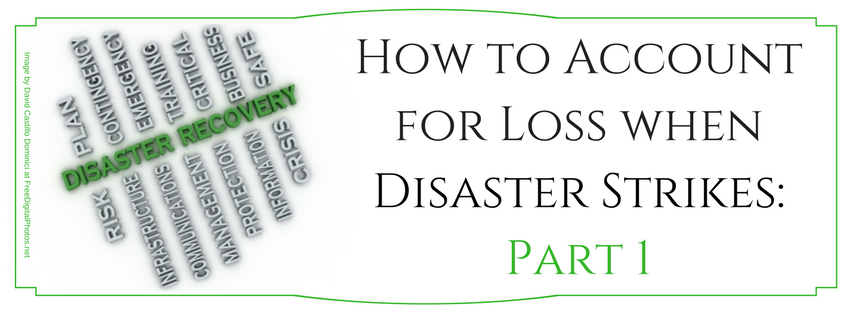With the most recent natural disasters happening around the world, worrying about how you can prepare and protect your business may be weighing heavily on your mind. You can find out what accounting steps to take in the event a disaster with information shared from CPAPracticeAdvisor.com.
When a flood, fire, hurricane or other disaster strikes your business, you may suffer heavy property damage along with lost sales during the time you’re forced to close. Having a good understanding of the accounting rules related to natural disasters can help you fully account for your losses, reduce the economic harm to your business, and obtain financial relief through insurance, tax deductions and other sources.
Accounting for Inventory Losses
Conduct a manual count of your inventory as soon it is practical to do so. Even if items are obviously a total loss, it’s a good practice to document the specific losses due to the disaster versus what you might have lost due to shrinkage or some other means before the disaster. This may also help with the insurance claims process.
You will need to update your balance sheet to reflect the current value of your remaining inventory. You can generally include inventory losses as an expense when you prepare your financial statements and file your tax return. However, you will need to adjust for any insurance reimbursements — you cannot both claim a loss expense and exclude the insurance claim from your income.
Accounting for Property Damage
Damage to other assets, such as buildings or machinery, is handled in a similar manner to inventory. If the damage is so substantial that it causes a significant decrease in the asset’s market value or prevents you from using the asset as you intended, you may be required to take an impairment loss and reduce the asset’s value on your balance sheet.
When you file your taxes, you may also be able to claim a deduction for any disaster-related decline in an asset’s value that was not reimbursed by insurance.
Visit our blog next week for part 2, we will be discussing what information you need to know about paying your employees if a disaster were to happen.
This information was written by Dennis Najjar, co-founder of AccountingDepartment.com, and shared on CPAPracticeAdvisor.com.
